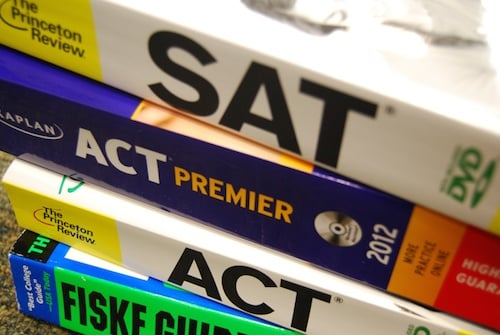
Timing is everything. Nowhere is this saying more true than in the college application process. From taking the SAT to writing your personal essay to submitting your Common App, the process takes months, if not years, to complete.
So when do you need to finish gathering all your application materials and submit them to your colleges? That all depends on your deadlines. This guide will go over the different options for college application deadlines, plus step-by-step instructions on how to keep track of them all.
First off, what are the different options for applying?
What Are the Options for College Application Deadlines?
There are thousands of colleges in the U.S., all of which may offer one or more of the following options for applying: regular decision (RD), early action (EA), early decision (ED), and/or rolling admissions (RA). The first three options have set deadlines, while rolling admissions is the odd one out with a range of time within which a student must apply.
When preparing to apply, you have to carefully research each school's policy. Some early action schools place restrictions on your applications to other colleges. Early decision involves a binding contract in which you promise to enroll in the school if you get accepted. Make sure you understand the rules, along with the pros and cons, of each option, before choosing one for your college applications.
To give one example, early admission pushes your college planning timeline earlier by a few months. Before choosing to apply early, you'll have to get ready with your SAT or ACT scores, recommendation letters, personal essay, and course grades. When you apply to your favorite schools, you want to make sure you're sending the very best application you can.
Another major consideration is financial aid. When you apply early decision, you agree to enroll before getting to see your financial aid offer. This could be a deal breaker for a lot of students, so ask yourself this question before jumping into ED and finding yourself in a tough situation.
These are two of the most important factors when planning out your application strategy. This guide will go into more detail about your application timeline below, but first let's look at the most common college application deadlines in 2024-2025 and popular schools that have them, starting with regular decision.

Most regular decision deadlines are in January.
What Is Regular Decision?
The majority of students apply to school regular decision. These are the college application deadlines you might have heard all about! Regular decision deadlines usually fall in the beginning of January (so much for a relaxing winter break).
The most common RD deadline is January 1. January 15 is a popular one, too. One big exception to the January deadline involves the schools in the University of California system. The UC application deadline is uniquely early at November 30. There are also some schools with late deadlines in February, March, or April.
In some cases, you'll need to complete part of your application before the final RD deadline. For example, if your school requires or recommends an interview, in some cases you'll set this up earlier.
Most commonly, though, you'll submit a complete application in January and then hear back sometime in March or April. You might be waiting for a lot of notifications, as you can apply to as many schools as you want under regular decision. Unlike some of the other admissions options, there aren't any restrictions placed on you when you apply RD.
Whether you're interested in the NYU application deadline or Stanford deadline, look no further. The RD deadlines of some popular colleges are listed below.

Regular Decision Deadlines of Popular Schools
| School | Regular Decision Deadline |
| American University | January 15 |
| Boston College | January 1 |
| Boston University | January 6 |
| Bowdoin | January 5 |
| Brandeis | January 2 |
| Brown | January 3 |
| CalTech | January 3 |
| Columbia | January 1 |
| Cornell | January 2 |
| Dartmouth | January 2 |
| Duke | January 2 |
| Emory | January 1 |
| Georgetown | January 10 |
| Harvard | January 1 |
| Johns Hopkins | January 2 |
| MIT | January 1 |
| New York University | January 5 |
| Northwestern | January 2 |
| Princeton | January 1 |
| Stanford | January 5 |
| Tufts | January 6 |
| UNC Chapel Hill | January 15 |
| University of California | November 30 |
| University of Chicago | January 6 |
| University of Michigan | February 1 |
| University of Notre Dame | January 1 |
| University of Pennsylvania | January 5 |
| University of Southern California | January 15 |
| University of Virginia | January 5 |
| Vanderbilt | January 1 |
| Villanova | January 15 |
| Wellesley | January 8 |
| Yale | January 2 |
Some of these schools also offer early action or early decision. Read on to learn about early action and the EA deadlines of some well-known schools.

What Is Early Action?
Early action pushes your deadline and notification earlier by a few months. The most common EA deadlines are November 1 and November 15. You'll hear back in December, maybe before you've even sent off your RD applications!
Under early action, you could get accepted or denied. There's also a third option unique to early admissions: getting deferred. Getting deferred means that your app is pushed into the regular applicant pool to be evaluated again later.
With more and more students applying early each year, early admissions is getting ever more competitive, and deferrals are becoming more common. It is possible that you could get accepted in the next review cycle. You might call the admissions office and ask for further information if you get deferred. You could also send your mid-year grades or updated test scores to improve your application. Don't despair if you get deferred—but do be proactive and figure out your next steps.
A few schools have a restrictive or single choice early action program that prevents you from applying to more than one school under EA. These schools include Harvard, Princeton, Yale, Stanford, and the University of Notre Dame.
If your school's not restrictive, then you can apply early wherever you want. But as MIT says, "If you apply to another school during Early Action that does have a restriction, MIT requires that you respect those rules...you may not simultaneously apply to MIT."
Besides the rare single choice EA program, early action doesn't have any other restrictions. You're not obligated to accept if you get offered a spot based on your EA application. Like with your RD schools, you have until the national response date of May 1 to make and submit your decision (and deposit).
Being able to wait until May 1 to choose your college allows you to gather all your acceptances and compare financial aid offers. As you'll see below, this opportunity isn't available if you apply early decision. Before delving into how ED differs from EA, let's take a look at some popular schools with early action and their deadlines.

Early Action Deadlines of Popular Schools
| School | EA Deadline |
| CalTech | November 1 |
| Georgetown* | November 1 |
| Harvard* | November 1 |
| MIT | November 1 |
| Stanford* | November 1 |
| UNC Chapel Hill | October 15 |
| University of Chicago | November 1 |
| University of Michigan | November 1 |
| University of Notre Dame* | November 1 |
| University of Virginia | November 1 |
| Villanova | November 1 |
| Yale* | November 1 |
*Restrictive or single choice early action.
Most schools offer one or the other when it comes to early action and early decision, though there are a small number that offer both, like UChicago. Much of what was true for EA holds true for ED, with one important difference—early decision is binding.

What Is Early Decision?
What exactly do people mean when they say that early decision is binding? They're referring to the contract that you, plus your school counselor and a parent, sign when you apply ED. With this contract, you agree to enroll in the school if you get accepted.
You're saying both that the school is your first choice and that you have no doubt you'll attend if accepted. If you apply ED and receive that happy news, then you'll accept the offer, send in your deposit, and withdraw any other applications you made to other schools.
You might be wondering how you can agree to attend a school before seeing your financial aid offer. If so, you'd be right that this is a potentially big drawback to applying ED. You're expected to commit without first seeing any commitment of financial aid from the school.
Does this mean you shouldn't consider applying ED if financial aid is important to you? Not necessarily.
If you have a dream school and you'd like to communicate your enthusiasm by applying ED, then I'd recommend speaking to its financial aid office about what its process is like. Do they meet all demonstrated need? Is there any possibility of renegotiation if your offer isn't what you thought it'd be? Make sure to answer these important questions before binding yourself to a contract you might not be able to fulfill.
The binding agreement you make with ED is the main feature that differentiates it from EA. Otherwise, it might have the same exact deadlines and notification dates. You might apply by November 1 or November 15 and hear back in December.
Some schools also offer Early Decision II. ED II still involves a binding commitment, but it pushes the deadline a couple months forward to January. Since early decision apps are put on the fast track, you'd hear back sometime in February.
Below is a list of popular schools that offer early decision and their ED I and/or ED II deadlines.

Early Decision Deadlines of Popular Schools
| School | Deadline for ED I | Deadline for ED II |
| American University | November 15 | January 15 |
| Boston College | November 1 | January 2 |
| Boston University | November 1 | January 6 |
| Bowdoin | November 15 | January 5 |
| Brandeis | November 1 | January 2 |
| Brown | November 1 | N/A |
| Colby | November 15 | January 3 |
| Columbia | November 1 | N/A |
| Cornell | November 1 | N/A |
| Dartmouth | November 1 | N/A |
| Duke | November 1 | N/A |
| Emory | November 1 | January 1 |
| Johns Hopkins | November 1 | January 2 |
| New York University | November 1 | January 1 |
| Northwestern | November 1 | N/A |
| Smith | November 15 | January 1 |
| Tufts | November 1 | January 6 |
| University of Chicago | November 1 | January 6 |
| University of Pennsylvania | November 1 | N/A |
| Vanderbilt | November 1 | N/A |
| Villanova | November 1 | January 15 |
| Wellesley | November 1 | January 1 |
| Wesleyan | November 15 | January 1 |
So far, all these application options involve specific set deadlines. You have to get your application, test scores, and everything else in on time. Late materials could hurt or eliminate altogether your chances of getting accepted.
There's one other option in the world of college admissions that's a bit more flexible: rolling admissions. Schools with rolling admissions open up a range of time for apps to "roll in"—and notifications tend to be spaced out over a few months, too.

What Is Rolling Admissions?
If your school has rolling admissions, then it gives you a window of time in which to submit your application. This period of time typically ranges from the fall to the spring. For example, there's no specific rolling admissions deadline for Penn State no specific Penn State. Penn State makes its application available on September 1 and reviews submissions on a rolling basis.
Some schools claim to have rolling admissions (RA), but also have a priority deadline in November or December. If you're really excited about a school, then you should try your best to meet the priority deadline. Effectively, this turns your RA school into one with a deadline. But at least its rolling policy gives you a safety net in case something comes up and you miss the priority filing date.
Even if your school doesn't have a priority deadline, it's a good idea to set one for yourself and get your application in early. RA is done on a first come, first served basis. There's always the possibility that spots could fill up, or get more competitive as there's less and less space for new students.
Besides upping your chance of admission, another motivating factor could be that the sooner you apply, the sooner you'll hear back. You might hear back just a couple weeks after applying, or the school might send out notifications on certain fixed dates throughout application season. Either way, the sooner you submit your app to them, the sooner they can give you an answer.
RA, unlike ED and some EA programs, is not restrictive. You can still apply anywhere else you want. Some schools with rolling admissions include Penn State University, University of Pittsburgh, Indiana University, Michigan State, University of Maine, University of New Haven, University of Alabama, and the University of Tulsa.
After reading through these options, you've noticed that schools vary in their deadlines and policies. Sometimes the admission policy of one school, like single-choice EA, affects how you'll apply to other schools on your list.
You want to make sure you're not breaking any rules or mixing up any key dates as you go through the process. With all these dates and deadlines, how can you keep track of everything?

Keeping Track of College Application Deadlines
You might get lucky and find that all your deadlines are January 1. Or you might have a mix of dates, with a restrictive November deadline, some January ones, and a few that are rolling. It's critical to keep everything recorded and organized, and not just so you get everything in on time. Your deadlines help determine other steps in the college app process, like when you should ask for recommendation letters and what dates you can take the SAT or ACT.
A lot of schools use a helpful online system called Naviance to keep track of your deadlines and requirements. Your Common Application will also show your college deadlines and most of the steps you've completed so far.
Considering all the accounts you'll create—Naviance, Common Application, College Board—make sure to write down all your usernames and passwords and keep them in a safe place. You definitely don't want to deal with the frustration of having to change passwords each time you log in or get locked out of your account the night of the deadline! All the organization that applying to college requires will help you develop and maintain good habits throughout senior year and into college.
If you prefer to have a hard copy or to reinforce the deadlines by writing them down, you could also create your own list of colleges and deadlines, along with a checklist of what you need to do. Here's what this would look like in its most basic form:
| School | Deadline Option | Deadline |
| College 1 | Regular | January 1 |
| College 2 | Restrictive early action | November 1 |
| College 3 | Rolling admissions | Apply by April (I'll apply by January 5)* |
*If your school has rolling admissions, you may set a deadline for yourself.
You can find full lists of early action deadlines and early decision deadlines in our guides, or you can search for "College Name + deadline." It's always a good idea to double check the most recent information from the college itself, as schools occasionally change their policies.
As I mentioned above, your deadlines affect how you get ready to apply. Some components that especially require early and thoughtful planning are the SAT and ACT, your letters of recommendation, and your personal essay.

When Should You Take the SAT or ACT?
Students almost always improve their scores when they retake the SAT or ACT. Taking the official test is a valuable experience that you can learn from. Plus, you can study your score report and prep to improve the next time you take the ACT or SAT. To give yourself opportunities to retake the SAT or ACT, you want to take it for the first time long before your college deadline.
If you're applying regular decision, you might take the SAT or ACT for the first time in the fall of junior year and again in the spring. Since it takes about three weeks for scores to be released, you might have a few more opportunities to take the exams in the beginning of 12th grade, like in August, September, November (or maybe December, depending on the admissions plan you choose).
If you're applying early admissions, then August, September, or October of your senior year would be your last chance to take the SAT or ACT. It'd be pretty nerve-wracking to put so much pressure on these last minute test dates. Ideally, you'd have your scores all set by the end of junior year. You could even push the schedule mentioned above up, so that you take your first test in the spring of sophomore year.
By knowing your deadlines, you can plan out your testing dates and study schedule to ensure you've achieved your SAT or ACT target scores in time to apply. The same goes for your recommendation letters.

When Should You Ask for Recommendation Letters?
A second component that requires advance planning is your letters of recommendation. You should ask your teachers at least a month before your application deadline. It can also be a good idea to ask 11th grade teachers at the end of your junior year, when they remember you best.
Besides making the request, you also should be filling out a "brag sheet" or sharing ideas with your teachers on what would go into your ideal recommendation letter. This means you've done some thinking about what you'd most like admissions officers to know about you and your goals for the future.
If you're applying regular decision, you should ask your teachers in November of your senior year, if not earlier. A lot of teachers set a quota—they can only write so many letters. If you know your English teacher will be bombarded with requests, for example, make sure to ask early!
If you're applying EA or ED, then you should put out recommendation requests at the beginning of your senior year. Again, you could also ask at the end of junior year and just follow up with a reminder in the fall. Finally, you'll also be working on your personal essay for a few months before your application deadlines.

When Should You Write Your Personal Essay?
I'm sure none of you have ever stayed up all night writing an essay due the next day...or maybe all of you have! But if there's one essay you shouldn't leave for a last minute all-nighter, it's your personal essay for college.
Even though it's a short essay—a maximum of 650 words for the Common App—it's a big challenge. Actually, the shortness of it is part of what makes it so tough. How can you home in on a specific experience that reveals something unique and significant about your identity in so few words?
Because it's such a challenge and so important in your college application, you want to start thinking about your personal essay early. Some students go through several changes of topics before discovering the best one. Even just reading the prompts and mulling them over are important parts of the writing process. Your ideas will benefit from incubation. You might be out running or taking a shower when an exciting essay topic pops into your head!
Apart from the brainstorming stage, drafting and revising takes a long time too. With only 650 words, you want to be careful that you're choosing the right ones and expressing yourself as clearly, powerfully, and vividly as you can. You might also elicit feedback from friends, parents, and teachers and incorporate their suggestions into your essay. Or not—above all, it's your voice and your story to tell.
The summer before senior year is a great time to work on your personal essay. At the very least, I'd recommend starting two to three months before your deadlines. No late night writing frenzies for your college essay—put the time and thought into crafting an essay that admissions officers will remember.
Other important aspects of your application are any other supplemental essays, sending your transcripts, and of course, the application itself. Take time to fill everything out accurately and write about your extracurricular activities in a compelling way. Finally, proofread and double check everything before pressing submit!
At this point, you should have a clear sense of the various deadline options for U.S. colleges and how to prepare your application in time. Let's go over the most important points to remember when applying to college.

Key Points to Remember
Colleges offer one or more of the following four options for applying: regular decision, early action, early decision, and/or rolling admissions:- The majority of students apply under regular decision. It usually has a January deadline and a March or April notification.
- Early action usually has a deadline in November and a notification in December. Some schools require single choice early action.
- Early decision is binding, meaning you agree upfront to enroll if you get accepted. ED deadlines might be in November and/or January, and you'll find out if you got in a month or two later.
Preparing your college application takes a long time, especially your SAT or ACT tests, recommendation letters, and personal essay, so plan ahead.
Above all, make sure to keep track of all your deadlines and plan out each component of your application. Spacing out the process will help you break it down into manageable steps and balancing it with your course work and extracurricular activities senior year. All this organization will help you with any projects and applications that lie in your future!
What's Next?
We're continually updating our site with in-depth guides to help you through the college process. Learn more about choosing a college, requesting recommendation letters, and preparing for the SAT and ACT.
- What College Should You Go To? How to Choose
- Should I Go to a Big or Small College?
- When is the FAFSA Deadline?
- Choosing your SAT / ACT Dates: When's a Good Time for You?
- The Ultimate SAT Study Guide for SAT Prep
- 4 Amazing Sample Rec Letters from Teachers
Plus many more articles to help you apply to college and understand college admissions!












